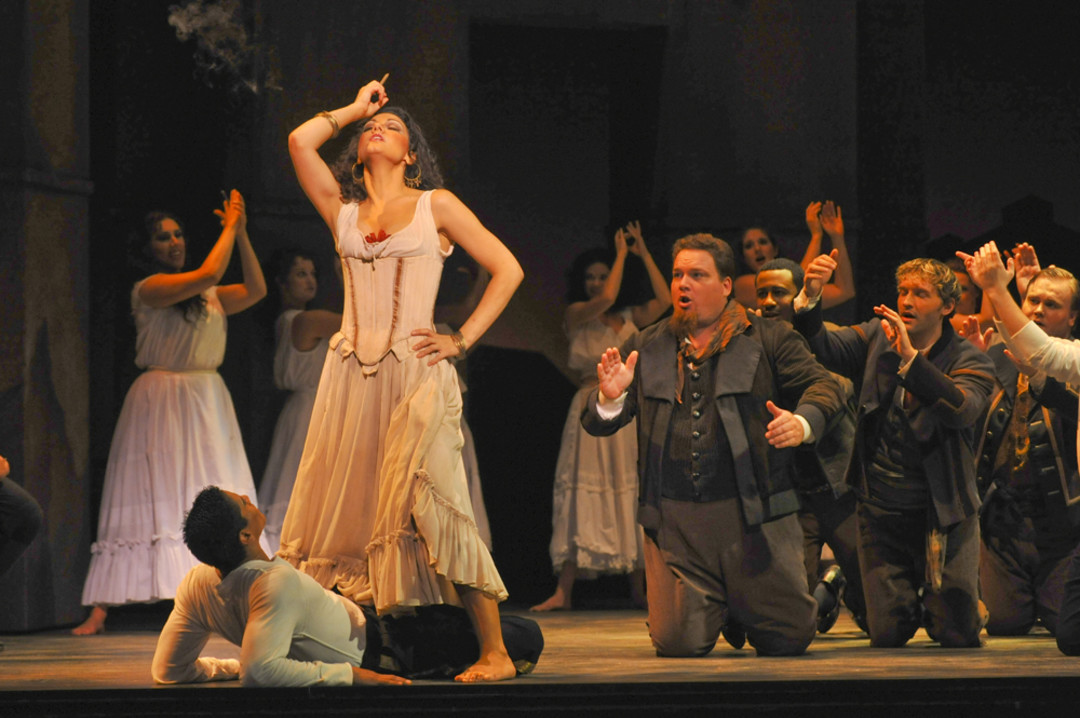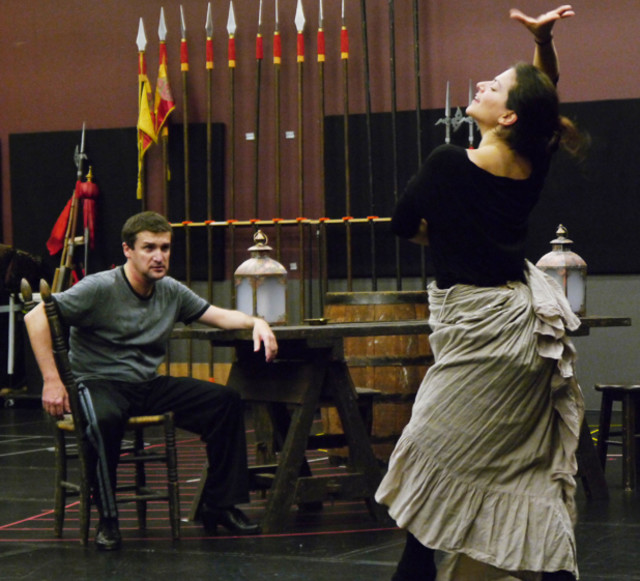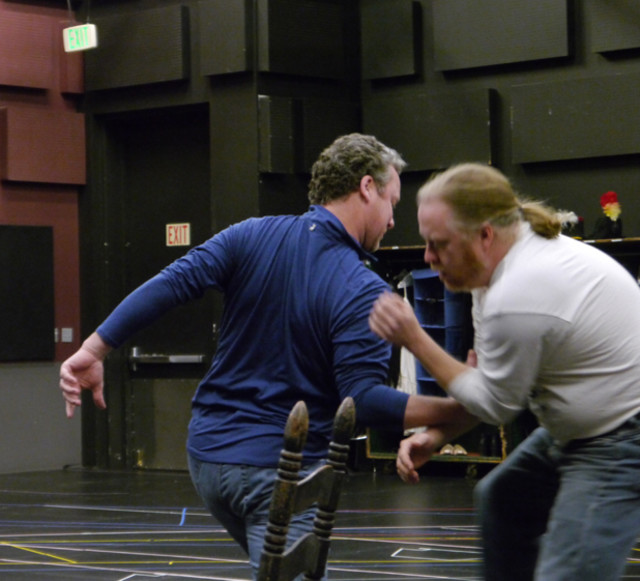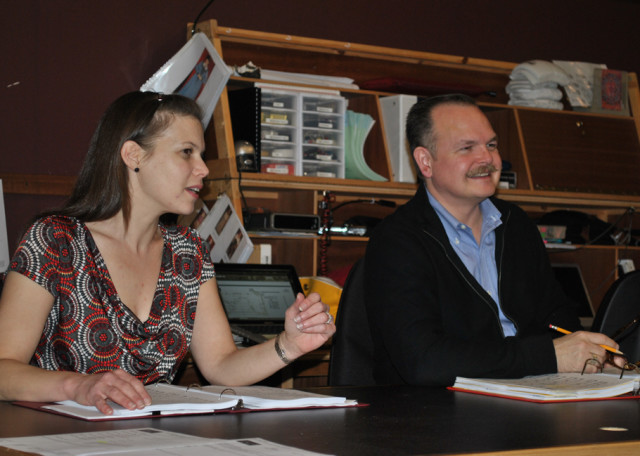The French Coach, Fight Master, and Flamenco Dancer: on Whipping Carmen Into Shape

Sandra Piques Eddy in Carmen, (2010), Kansas City Lyric Opera,
Image: Karen Almond
With haunting melodies, risqué plot, and folk influences, Georges Bizet’s notorious opera Carmen (a critical disaster on its 1875 premiere) is now recognized as one of the genre’s greatest achievements.
Set in Spanish barrooms and bullrings, sung in French, and advanced by fistfights and knife-play, Carmen isn’t easy to stage. In fact, Portland Opera enlisted a flamenco choreographer, a fight director, and a French coach to help pull off their production, which opens on Feb 6, with legendary mezzo-soprano Sandra Piques Eddy in the title role. We ask these expert consultants to share their favorite moments on the job.
Glenda Sol Koeraus: Flamenco Dancer/Choreographer

Glenda Sol Koeraus in rehearsal with her dance partner Antonio Granjero.
As a girl, Argentinian Glenda Sol Koeraus saw flamenco performed by a famous gypsy, and found her life’s calling. In mid-January, the New York-based dancer (fresh from the MET’s production of La Traviata) traveled to Portland to choreograph Carmen. Her role isn’t entirely behind-the-scenes; look for Koeraus onstage, dancing circles around the other “cigarette girls.”
On Flamenco: Flamenco is a way of life. It’s not the steps, it’s more than a dance—it’s a culture. We are dancing 24 hours a day. We live flamenco. You don’t need anything special to do it because it’s inside of you. You can even do it if you don’t have the music. I guess you just need the shoes.
On Portland: I was here on tour two years ago with Noche Flamenca but I didn’t really get to see the city. This time I plan to get to know more of Portland. The weather is not as cold as New York, and the people I find more friendly.
On Carmen: When [Director] Eric [Einhorn] called me, I was like oh, nervous because my thing is traditional flamenco. He started explaining to me he wanted to do a real Carmen, not the stereotype. He said, ‘you know I want a real party’ so I thought, okay, I can bring the espontáneos thing that flamenco has. And the magic—I think we can bring a little duende, the flamenco spirit, to it.
Favorite moment so far? The part where we get to dance on the table and oh, the fight! The fight is fun! They’re all such a good actors, I was nervous, but the fight coach came and ha! I get a scar and everything.
JOHN ARMOR: FIGHT DIRECTOR

John Armor takes a "punch" thrown by actor Chad Shelton (Don José).
Trained at the British American Drama Academy in London, John Armor also dabbles in acting, directing and yes, armor-making. An assistant director at Portland Opera since 1992, he brings big brawls to life in this production—and also some whip work.
On Fighting: Stage combat takes precise attention to detail because if I turn my hand a few inches in one direction, you see it happening; if I turn it the other, you don’t. Good technique allows performers to embrace their passion as much as possible while keeping each other safe—so the audience really gets to see a moment of passion rather than a moment of “Well, there could’ve been a fight there.”
On Portland: I’ve been here about 27 years; in the Portland area there are more and more fight directors now—probably seven or eight full-time guys. Hooray, finally! It’s nice to have more out there. Of course, all of us also act and/or direct and/or produce. We’re theater artists; we do everything we can.
On Carmen: In this particular show there’s a little bit of knife work, [and a] little bit of fisticuffs and people throwing people about. We also have a whip. Don’t think Indiana Jones, but there is a whip involved.
One thing about opera: we can’t do so much that they [the actors] can’t sing afterwards. We have to take into account that occasionally in a fight there may be a line of singing that still needs diaphragm, and they need to be in the right place where they can see the conductors.
Favorite moment so far? Besides Escamillo learning to crack the whip? I like the moment between Don José and Zuniga, when Zuniga is captured and gets smacked with a gun in the head. It’s a nice, frenetic moment of violence that really puts the passion into the moment.
Jennifer Perlmutter, PhD: French Diction Coach

Jennifer Perlmutter observing her first rehearsal as Portland Opera's French diction coach. Seated with her at the table is Richard Blanton, Stage Manager.
Portland State University professor Jennifer Perlmutter has spoken French since the age of seven, and worked with resident artists for years. But with this production of Carmen, the master of seventeenth-century literature tries her hand, for the first time, at coaching singers one-on-one. Vous ne parlez pas français? No problem: subtitles provided.
On French: A really big skill for actors is being able to distinguish sounds--to distinguish an ou from an u and e from an é. Also, this sounds weird, but having a lot of muscle tone in your lips. French is a really staccato, militaristic language—everything gets the same amount of time—and you have to have a lot of tension in your lips to make it correct.
On Portland: It’s actually a very Francophile city. Wine, food, the appreciation of literature. I think Portland attracts Francophiles because it’s what they call a human-sized city. You hear every French person say, “Oh, this is very human, very human.” It’s not the huge skyscrapers of Chicago or New York.
On Carmen: The actors have to be able to say things with passion and conviction, and they have to sound authentic. There are so many emotionally charged scenes, and a lot of flirtation; you need to be able to portray that convincingly and not sound like a caricature of a French person while you’re doing it.
Favorite moment so far? When Don José tells Carmen she’s a devil and she says, “Yes, but I already told you that!” I mean, how can you not like the star? She’s just such a flirt. I was going to say devilish, but I guess you could say diabolique.




